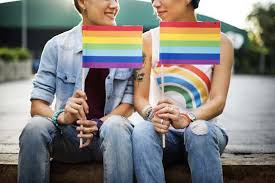
Homosexuality
Homosexuality as an affliction due to societal norms
Korean author Kim Hye-jin in her work “Concerning My Daughter” explores the unconventional life of homosexuals through the eyes of Green’s ageing mother who is conflicted with her lesbian daughter’s non-traditional life choices and the havoc she’s stuck in by having a same-sex partner.
“Hostility and hatred, derision and abuse, rage and ruthlessness – she’s right in the midst of it all.”
The narrator (Green’s mother) presumes her tricenarian daughter’s “abnormal life” in the above words. Crude but accurate. Despite living in a world with fast-developing economies and technologies society still resumes the conventional beliefs as a norm. Green’s mother’s essential beliefs affirm the ‘unideal life of the homosexuals’. Restricted and loathed in the heteronormative world, Green and her girlfriend Lane, like other sexual minorities, depicts the malice homosexuals receive frequently. They’re not only brutally scrutinized by society but also by their family who fail to overcome the traditional beliefs and accept them.
‘Queer – strange and odd’ why? Because these queer people lie outside the boundary of heteronormativity. Same-sex partners are scrutinized and concluded to have ‘mental illness’ or a ‘youthful misunderstanding’. In the words of Green’s mother “Perhaps my daughter is mistaken. A misunderstanding between two girls who are still foolish and naive?” vividly disregards the identity of her daughter. Kim Hye-jin skillfully depicts the vulnerability and loss of identity that sexual minorities face in a society where heterosexuality is regarded as normal.
Green’s gender as a lesbian confines the narrator within her room. A sense of distress due to the existence of “that girl” Lane. Her lack of affinity and absence of any genuine attempt to understand her daughter’s life choices remarks the agonizing circumstances homosexuals face after coming out. The narrator assumes a sorrowful inner monologue for her daughter wherein she blames herself for having raised her wrong contradictory to her indifferent and discriminated conduct towards Lane.
She contemplates “to knock the chair over and chase Lane out of this house by force, with my bare hands, I want to yank her around by the hair, tear at her face, and make sure she never comes near my daughter or this house ever again. No. I want to kill her. I want this girl and endless source of torment, sadness and misfortune, to disappear forever.” A mother who can love can be a mother who discriminates. Perhaps the true tragedy isn’t the paucity of empathy but the abundance of animosity.
When essentialism overpowers existentialism, gender becomes a plague. What’s more, this discrimination starts in one’s household and all that follows is a look of anguish, dejection, and resentment. Slowly but surely breaking a person from the inside and out, depriving them of the privilege to form a family. Turning sexuality into a curse wherein heterosexism reigns.
The world is so used to male-female families that could create a child that it denounces varied types of amicable families. The dichotomy being characterized as anomalous rather than a distinctive identity fuels the deprivation of human rights. Society attempts to assert their ‘normal life’ superiority over sexual minorities by labelling them as “Unqualified. Homosexuals. Do not meet standards. Lesbian. Abnormal.” thereby stripping them of a dignified life. The world seeks similarity and condemns the dissimilarity as a genesis of unpleasant imbalance.
Green, a lesbian professor through her heartfelt monologue portrays the social exclusion of the homosexual family in the following words:
“Why do I need a husband and children to have a family? Ma, Lane is my family. She’s not a friend. We have been family to each other for the last seven years. What is a family? Family is people who support you and are always there for you. Why is that family and not this?” Society’s traditional belief that a family comprises ‘husband, wife and their children’ shatters and discriminates against homosexual families. The stigma and disparity often make them vulnerable to depression, panic attacks, desolation or suicide crises.
Green highlights how society stops “me from having a family, career, everything”. Emphasis is laid on the distressing trajectory of homosexuals. Surely, such a misfortune could be avoided, inevitably by assuming an unconventional outlook rather than a negative perspective such as disgust, resentment and hate. But who is to stop these illogical ideologies? Is it so difficult to cross the “blue-black river” and accept people as they are? Lamentably, the world lacks compassion for the minority and ruthlessly seeks pleasure in whispers and rumours.
Same-sex partners are categorised as a ‘temporary’ compadre. In light of the evidence of Greek antiquity with the prevalence of “erastes-eromenos” (gay partners) such relations were regarded to be temporary and were to be stopped after a certain interval. Likewise, the narrator comments “What I need in my house now isn’t people who can leave at any time, but family. That’s the only thing that will protect my daughter.” The distinctions between the intergenerational beliefs formulate homosexuality as a seed of conflict between the narrator and her daughter.
“A relationship that cannot make a child. A meaningless bond that cannot create anything. A life that will remain incomplete to the end. And the subsequent loathing and insults that will follow them relentlessly like shadows. The weight of the humiliation and self-blame they will have to bear.” Eventually, Green’s mother presents society’s views in her internal monologue addressing the abnormality and implications of homosexuality.
To put it another way, only when the malice and fear of homosexuals disappear and sexual orientation isn’t regarded as a determining factor, can true liberation be obtained. Consequently, instead of accepting and significantly liberating sexual minorities society indulges in allegedly scrutinizing and subsequently shattering their life and livelihoods. In other words, homosexuals are indeed amid “Hostility and hatred, derision and abuse, rage and ruthlessness”.
By: Darshna Kaur
Write and Win: Participate in Creative writing Contest & International Essay Contest and win fabulous prizes.


